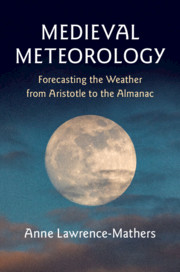Book contents
- Medieval Meteorology
- Medieval Meteorology
- Copyright page
- Contents
- Preface
- Acknowledgements
- Introduction
- 1 Recreating Meteorology in the Early Middle Ages
- 2 Meteorology, Weather Forecasting and the Early Medieval Renaissance of Astronomy
- 3 Exploratory Encounters with the Work of Arab Astronomers and Meteorologists
- 4 Meteorology, the New Science of the Stars and the Rise of Weather Forecasting
- 5 The Contested Rise of Astrometeorology
- 6 Applying the Science of Astrometeorology
- 7 Astrometeorology and Mechanisation
- 8 Weather Forecasting and the Impact of Print
- Conclusion
- Bibliography
- Index
1 - Recreating Meteorology in the Early Middle Ages
Isidore and Bede
Published online by Cambridge University Press: 08 November 2019
- Medieval Meteorology
- Medieval Meteorology
- Copyright page
- Contents
- Preface
- Acknowledgements
- Introduction
- 1 Recreating Meteorology in the Early Middle Ages
- 2 Meteorology, Weather Forecasting and the Early Medieval Renaissance of Astronomy
- 3 Exploratory Encounters with the Work of Arab Astronomers and Meteorologists
- 4 Meteorology, the New Science of the Stars and the Rise of Weather Forecasting
- 5 The Contested Rise of Astrometeorology
- 6 Applying the Science of Astrometeorology
- 7 Astrometeorology and Mechanisation
- 8 Weather Forecasting and the Impact of Print
- Conclusion
- Bibliography
- Index
Summary
This chapter first explores how early medieval writers, and especially Isidore and Bede, made fundamental contributions to a new understanding of the natural world and its workings. They both quarried classical works for factual information and empirical observations, and placed these within a Christian cosmological model. An outline is given of the monastic science of ‘computus’, which was fundamental for teaching on natural philosophy and for theories about the weather in particular. Summaries of introductory works by both Isidore and Bede demonstrate their respective meteorological models; Bede’s views on the powers of the planets are covered in detail. Special attention is given to Bede’s The Reckoning of Time and the complex information on astronomy and meteorology which it expounds. An important conclusion is that Bede produced an understanding of weather as the intelligible and predictable result of astronomical and climatic factors. Overall, the chapter argues that classically derived natural philosophy and Christian cosmology were successfully integrated, and that the two together provided the basis for a new approach to weather and its prediction.
- Type
- Chapter
- Information
- Medieval MeteorologyForecasting the Weather from Aristotle to the Almanac, pp. 17 - 39Publisher: Cambridge University PressPrint publication year: 2019

